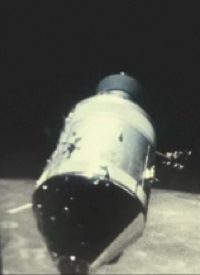
The success of the United States’ manned missions to the Moon have been the focus of strange conspiracy theories for decades, and a new movie, Apollo 18, feeds on such theories. Apollo 18 walks the border between science fiction and horror; its implausible premise — that mankind abandoned the exploration of the Moon because of a fear of beings living there — is pursued with relatively competent writing, acting, and special effects. The film also catches elements of its purported historical context, which bring out a certain depth to the film which younger audience may have difficulty grasping.
There is an element of political naïveté portrayed by the characters in Apollo 18 that seems almost incomprehensible at a time when cynicism is now carefully cultivated. In one scene, for example, when faced with the prospect that the United States government had sent its astronauts to the Moon as little more than ‘lab rats’ who could be abandoned on the lunar surface, one of the characters alludes to the recently revealed details of the Watergate scandal — recalling how such events shaped their time. Americans are, perhaps, less surprised by their government cynically abandoning her ‘heroes’ in the pursuit of goals far less than noble.
The Nixon Administration’s decision to cancel the Apollo program and scrub several moon missions in the process has been a source of profound frustration for advocates of manned space flight and lunar exploration since the president made the decision to cancel Apollo missions 18, 19, and 20. The cancellations were most likely the result of a lack of vision and budgetary restrictions; from the narrow calculations of the Cold War, the crucial point had been proven by Apollo 11: The United States had won the race to the Moon, and now we could stop running.
The “Space Race” between the United States and the Soviet Union is a crucial element of the context for the entire film; for those viewers too young to remember the Cold War, the interplay between international conflict and something as unlikely as two nations "racing" each other to reach the Moon may seem incomprehensible. After all, a generation raised fighting Jihadists who seem more likely to believe the world is flat than they are likely to be inclined to travel into space, hardly makes for appreciation of events such as the Space Race.
Apollo 18 is set forth in the format of “found video” along the lines of the Blair Witch Project (1999). Such an approach works well for Apollo 18, though the final scenes might leave viewers wondering how such video could even have been found. The consistent attention to making such video feel right for the period certainly helps, though artless mistakes — including the failure to simulate low gravity on the lunar surface — detract from the effect. The notion that the launch of a Saturn V booster could simply be lost to history — until now — is another of many points in the film which strains the viewer’s ability to suspend disbelief. Essentially, enjoying Apollo 18 requires ignoring more incongruities than usual in films of the “found video” genre.
The film hinges on the performances of Warren Christie, Lloyd Owen, and Ryan Robbins in the roles of the three Apollo astronauts. Their acting in Apollo 18 may not win any awards, but they do carry off their roles with sufficient plausibility. The presence of life in the form that terrorizes two astronauts on the lunar surface unfolds gradually; the implications of the presence of a Soviet lander on the Moon — and the tragic end of that mission — only sink into the minds of the two LEM astronauts with the agonizing slowness typical of designated victims in a horror film. The interplay between Christie and Owen on the lunar surface is fleshed out sufficiently to give a sense of camaraderie between the two men; Robbins' role, set in isolation in orbit around the moon in the return capsule, makes his part more difficult, in a sense, because of the lack of sustained interaction with other actors. Still, there is a believability to their portrayal of their respective roles.
Apollo 18 is a film worth seeing; its premise is weak, but the actors seem to do the best they can with the material, and the story is sufficiently different from other lunar conspiracy stories to provide entertainment. The isolation of the lunar surface is well-portrayed, and the movie is a reminder of how dangerous the real Apollo missions were. One did not need murderous aliens to render the lunar surface a deadly environment. The bravery demonstrated by the twelve Americans who walked the surface of our planet’s satellite ought to shine all the brighter in our minds when we consider how pale such fictional representations are by comparison.



